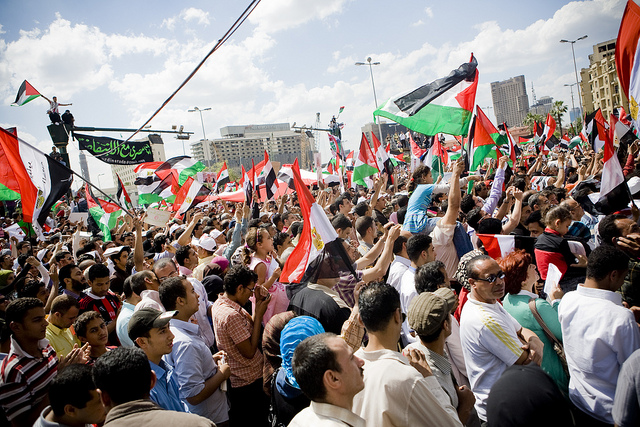
Thousands of protesters in Tahrir Square, Cairo, on Friday May 13, 2011. Image by Hossam el-Hamalawy.
Online activism has become increasingly visible, with social media platforms being used to express protest and dissent from the Arab Spring to #MeToo. Scholarly interest in online activism has grown with its use, together with disagreement about its impact. Do social media really challenge traditional politics? Some claim that social media have had a profound and positive effect on modern protest — the speed of information sharing making online networks highly effective in building revolutionary movements. Others argue that this activity is merely symbolic: online activism has little or no impact, dilutes offline activism, and weakens social movements. Given online activity doesn’t involve the degree of risk, trust, or effort required on the ground, they argue that it can’t be considered to be “real” activism. In this view, the Arab Spring wasn’t simply a series of “Twitter revolutions”. Despite much work on offline social movements and coalition building, few studies have used social network analysis to examine the influence of brokers of online activists (i.e. those who act as a bridge between different ideological groups), or their role in information diffusion across a network. In her Policy & Internet article “Brokerage Roles and Strategic Positions in Twitter Networks of the 2011 Egyptian Revolution”, Deena Abul-Fottouh tests whether social movements theory of networks and coalition building — developed to explain brokerage roles in offline networks, between established parties and organisations — can also be used to explain what happens online. Social movements theory suggests that actors who occupy an intermediary structural position between different ideological groups are more influential than those embedded only in their own faction. That is, the “bridging ties” that link across political ideologies have a greater impact on mobilisation than the bonding ties within a faction. Indeed, examining the Egyptian revolution and ensuing crisis, Deena finds that these online brokers were more evident during the first phase of movement solidarity between liberals, islamists, and socialists than in…
